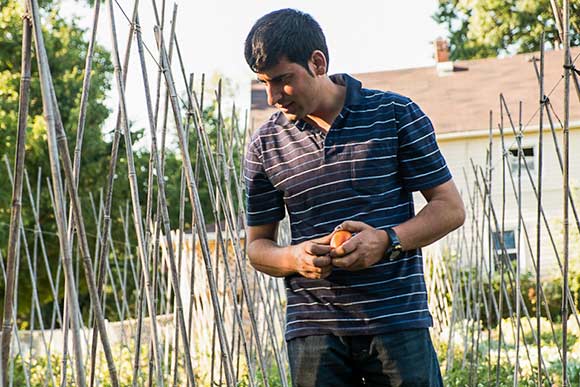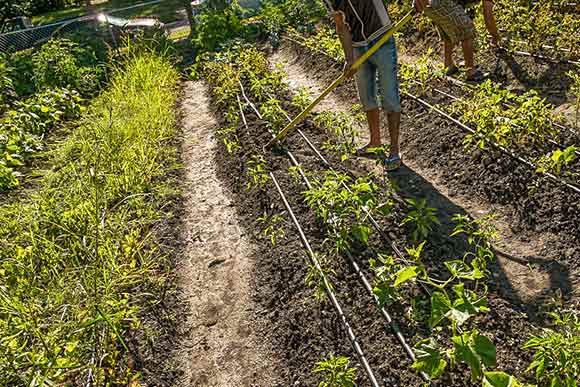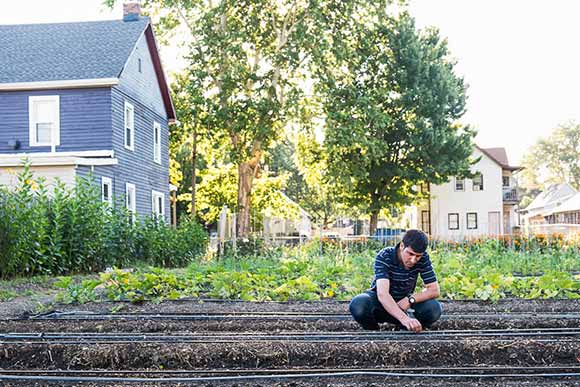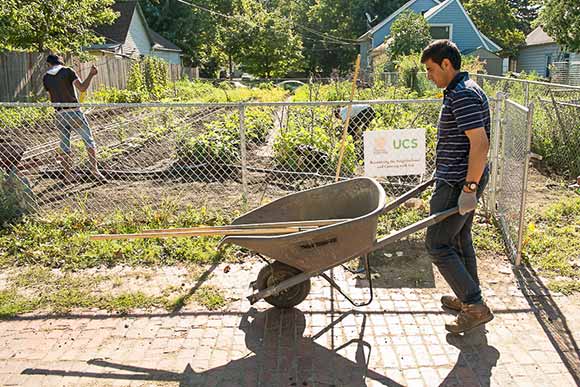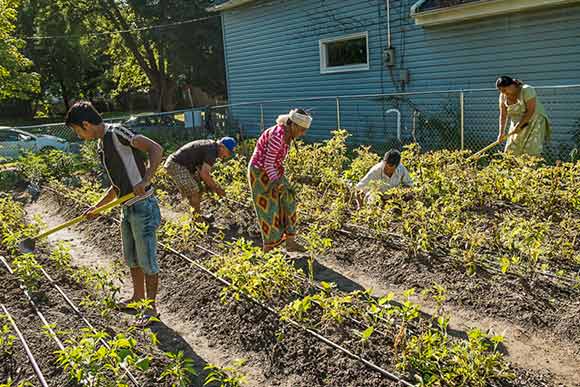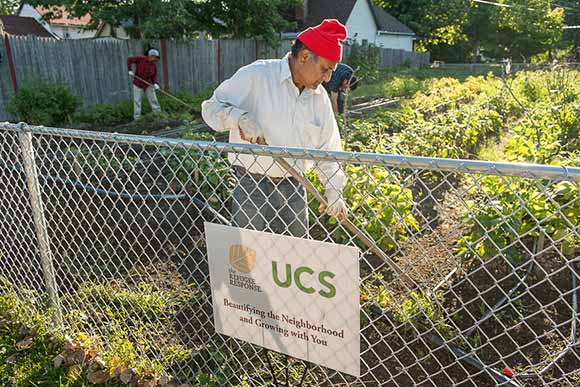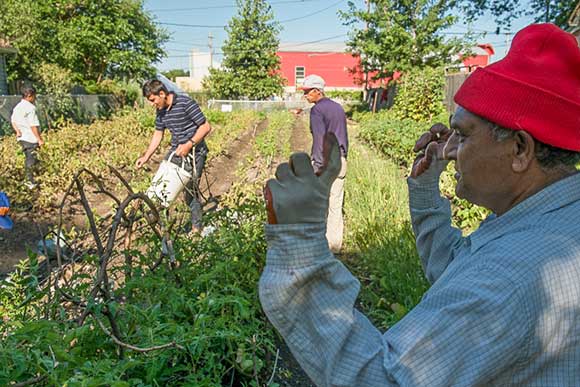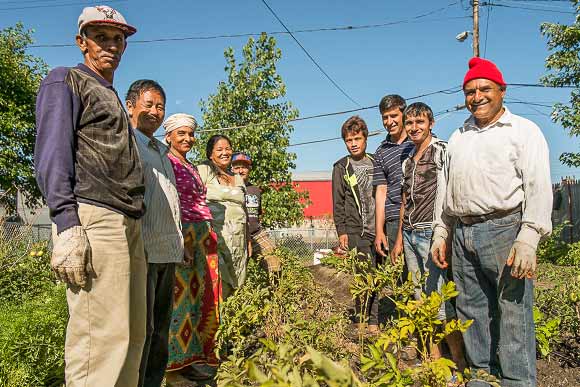Afghan refugee leads game-changing urban farm
Mohammad Noormal came to Cleveland as a refugee in October 2014, after working for five years as a translator for the U.S. army in his home country of Afghanistan. Feeling increasingly threatened by the Taliban and Al-Quaeda, he was resettled through an expedited visa process, SIV (Special Immigration Visa), for Afghans employed by or on behalf of the U.S. government, with the help of a nonprofit called International Services Center. The latter assisted Mohammad in finding the West Park apartment where he and his family still live and provided them monthly financial assistance until he found a job.
In the short time since his arrival, the Afghan refugee has turned Cleveland into his home. He chose the city because he had friends and family members already living here. Now, every weekend, he plays soccer with some of his Afghan friends and has dinner or tea with one of the six Afghan families that he is close with during weekdays.
Mohammad is also the manager of a game-changing initiative for education, urban farming and refugee integration, the Learning Garden and Production Farm. Created as a collaboration between The Refugee Response and The Urban Community School (UCS), the Garden and Farm occupies six vacant parcels adjacent to the school. They act as a learning space, where children participate in hands-on lessons that complement and enhance the curriculum in a wide variety of subject areas, including math, art and science.
The Refugee Response helps refugees acculturate to Cleveland, empowering them to become self-sufficient and active city residents and helping them rewrite their story from hardship to hope. It also operates part of the six acres of the Ohio City Farm, one of the largest urban farms in the country. Founded by the Ursuline Sisters of Cleveland, UCS is an independent school on the near west side, serving 78 percent students living at or below the federal poverty level.
Just six months after moving to Cleveland, in March 2015, The Refugee Response hired Mohammad, placing great value on his experience in agriculture, education and management. In January 2015, the Afghan refugee had met Darren Hamm, the Executive Director of The Refugee Response, at an event in Downtown Cleveland. After talking about his knowledge of agriculture, they exchanged emails. Hamm soon informed him about the new position as manager for the Garden and Farm project, so Mohammad applied and was chosen.
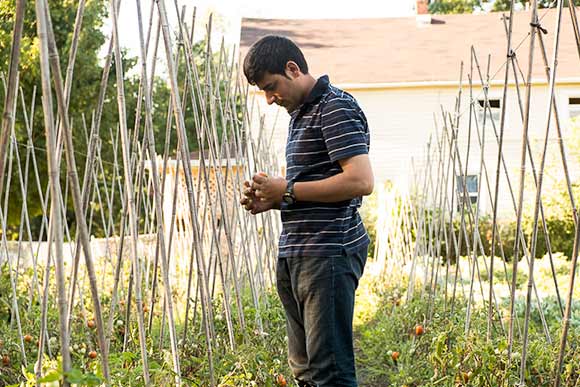 Mohammad Noormal
Mohammad Noormal
Mohammad reveals: “I am happy that I have a job in my own profession … and we feel safe.” He has a Bachelor's in Agriculture, an extensive family history of farming, including farming on the military base, and ample knowledge and skills regarding the use of vegetable, fruits, grains and all Asian crops.
The Afghan refugee was given the opportunity to take over and shape this new position with new partners and is responsible for maintaining and caring for the garden space. Apart from this role, Mohammad is also the Refugee Empowerment Agricultural Program (REAP) Coordinator and Farm Manager at The Refugee Response. According to Hamm, he has successfully “supported and deployed our trainees at UCS, engaged and managed our community gardeners, and helped these sites into highly productive farms.”
The garden and farm are still in their infancy, having only begun operations this past spring. Nevertheless, they are game-changing projects. Tom Gill of UCS emphasized that they “provide tremendous opportunities for cross-cultural and intergenerational learning, by allowing the students to appreciate the refugees, their work, stories and food, while also furthering their commitment to social justice and building tolerance.” The students also learn to care about the environment, find out where food comes from and combine knowledge with play to increase physical activity. According to Gill, all of the over 500 students will engage in the garden through the school’s Garden and Healthy Lifestyles Coordinator, Brandon Traud, coordinating lessons through the Garden curriculum, developed by Cleveland Botanical Garden specialists.
For Refugee Response, integrating its programming with K-12 institutions, such as UCS, allows it to grow its urban farm operations and access new land opportunities. The nonprofit is currently considering spaces ranging from one to three acres. The latter would allow the nonprofit to double the size of its farm operations. Expanding in scale enables the nonprofit to provide a larger number of refugee trainees a formal farm experience under another recent initiative, the Small Farm Incubator Program, thus building their professional development and helping them become farmers. The incubator is a multi-year agricultural training, combining classroom lessons of English and food production skills with field experience. It currently serves seven refugees. While they are not earning an hourly wage, they can sell the produce obtained from the Learning Garden, generating additional income for themselves and their families and contributing to the neighborhood’s development.
For Mohammad, the Garden and Farm project has opened the door to integration in Cleveland, which has proven to be a welcoming new home for him and his family. He wants to assist other refugees, especially Afghans, to gain access to similar opportunities as he did, ranging from interpretation and translation to employment coordination and general advocacy. According to Hamm, Mohammad has become “key to discussions around organizing the Afghan community around cultural activities and social support, as well as creating economic opportunities for those at home with children or without work in the coming years.” Hamm emphasized that, while Mohammad is the first Afghan that Refugee Response has worked with, “his various talents, and passion for serving his community, will allow us to play a greater role in supporting our newest Afghan community members.” Mohammad estimates that there are around 60 Afghan families, living mostly in the Lakewood area.
In order to better serve and help integrate an ever-changing and diverse range of refugees in Northeast Ohio, Refugee Response is involved in the Refugee Services Collaborative of Greater Cleveland. The latter is a group of Cleveland organizations that work together to serve the increasing numbers of refugees resettled in the city. It provides and seeks to improve access to housing and employment opportunities for the refugees as well as access to quality support services, such as health care, education and family programs. The Collaborative also seeks to develop a public dialogue between elected officials, municipalities, schools and other interested parties regarding their respective roles in the cause.
Apart from these larger policy changes, The Refugee Response is also working on expanding their farm operations, and modeling from The Learning Garden and Production Farm by exploring sites adjacent to area schools.
Mohammad will be a key participant in this extension initiative. In order to further build his professional experience, he wishes to obtain an advanced degree in agriculture and has been looking into various programs. The Refugee Response is currently exploring how to leverage its partnerships in pursuing this objective and other opportunities, which would further enable Mohammad to be a successful contributing member of the Cleveland community. Mohammad stresses: “I want higher education for me and my kids to serve other people and the country and to improve our lives forever."

